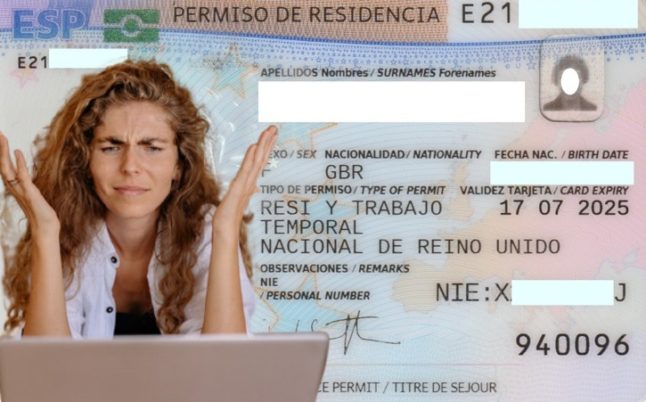Why are some residency applications getting rejected?
“Proofs of residency by the 31/12/2020 are key to the success of the application process,” Alicia Gárate, the International Organization for Migration’s coordinator for the UK Nationals Support Fund Project in Spain, told The Local Spain.
“It is important to gather as much information as possible to prove that you were a legal resident in Spain before the end of the transition period.
“In addition, there can be challenges that are very specific to each situation and are complex, therefore they need to be analysed and addressed in detail from a legal perspective and according to the Withdrawal Agreement.
“IOM is able to provide individual support to UK nationals who are struggling in these cases.”
It’s worth noting that Britons who are already holders of a green residency certificate and wish to exchange it for the new biometric TIE card do not have to provide as much documentation and the process is fairly straightforward.
However, for UK nationals who have not been previously issued a green residency document, the requirements from Spanish extranjería authorities are stricter and require more paperwork as they have to prove they lived in Spain before Brexit and that they have the financial means and health cover to not be a burden to the system.
The differences between the different processes are detailed in this document by the Spanish government.
“In our experience, rejection of residency applications is actually quite unusual,” a spokesperson for Age in Spain, one of the other groups currently helping Britons with residency applications, told The Local Spain.
“Most of the time it comes down to a relatively small problem in the application – a mistake on a form, a section that has not been completed or a missing or out-of-date document, for example.
“Whenever people need support with the residency process we work with them to make sure that these things are sorted before an application is submitted.
“If a residency application is rejected then Age in Spain works with that person to help them resolve the problem.”
READ ALSO:
- Q&A: Everything you need to know about Spanish residency for Brits post-Brexit
- British Embassy in Madrid publishes a list of alternative documents to prove residency
- How to apply for Spain’s TIE residency card
Anne Hernández, head of Brexpats in Spain, told The Local that several Britons had contacted her to inform her that their residency applications had been rejected because the private health insurance policy they had taken out didn’t start before January 1st 2021.
“Setting up a private medical insurance policy can take several weeks,” Hernández said.
“Legally they can’t backdate it, even if they took out the policy in December 2020.”
“These are isolated cases, so far I’ve heard of it happening in Alicante and Málaga, but I’ve also been told that some immigration officials are not accepting a padrón (town hall registration certificate) that wasn’t issued before December 31st 2020.

Photo: Jose Miguel Guardeño/Pixabay
“I’ve also been told that on other occasions applicants are being asked to provide translations or legislations of their documents having not done so initially.
“Or to provide a more current bank statement which shows that they were living and spending in Spain before the end of the transition period.”
In a recent Facebook post, Citizens Advice Bureau Spain wrote that “some companies present applications with incorrect documentation”, in reference to gestorías and other legal companies (not the ones quoted in this article) that are now offering Britons help with the residency process for a fee.
“Please be diligent,” they stressed, which is a reminder that it’s always worth double-checking the requirements and paperwork yourself even if you’ve enlisted the help of an agent.
Can Britons appeal if their residency application is rejected?
“If a UK National’s residency application is rejected they can appeal the decision,” Alicia Gárate of the IOM stated.
“It’s important for them to know that if it is rejected and they appeal, then they have the right to remain in Spain during the appeal process.
“Information on how to appeal is included in the ‘resolución’, the letter that UK nationals receive from the Spanish authorities as a result of their application.
“While the appeal is considered, there is no loss of rights for the UK nationals and they are able to remain in Spain”.
UK nationals who are struggling with the procedure or are not sure about what to do next can contact the IOM’s UK Nationals Support Fund as they have been supporting those who are facing specific challenges with their applications. They can also provide support and advice on the appeal process as needed.
“We have a dedicated team of caseworkers to support UK nationals who are struggling. We encourage UK nationals who are facing difficulties to get in touch with us at IOM Spain, Madrid (0034) 699 581 855, Murcia (0034) 648 642 543, Andalucia (0034) 650 339 754/ 616 825 704 or they can email us at: [email protected] and visit our website.”
Age in Spain also gave more details on the appeal system: “An appeal is a formal written document you can prepare and present to the Spanish administration in case you disagree with their resolution about your residency process.
“You will have one month to present the appeal to the office that issued the resolution of your residency process, counting from the day after you received and signed that resolution.Your appeal will be issued to a judge that will then send the judgement to the Immigration Office.
“If the appeal is finally accepted by the Immigration Office, you will receive a document called “Carta de estimación favorable“, which is equivalent to the “resolución favorable” and therefore allows you to proceed to get your fingerprints taken and issue your residency card.

Photo:Startup Stock Photos/Pexels
What do I need to start an appeal?
“It is important to note that rejected processes usually happen due to the nuances in each residency application, and therefore the documents needed to proceed with the appeal may vary from case to case,” Age in Spain stressed.
Some of the requirements for the appeal are:
- Name and surname
- NIE or ID number (passport)
- The resolution which is being appealed and the reason that justifies the appeal
- Institution where the appeal will be sent. In this case the Immigration Office of your province (Oficina de Extranjería)
- Details and particularities that justify our appeal, explained thoroughly and based on legal assumptions
- Date, signature and place where the appeal was made
Can I present an appeal by myself?
According to Age in Spain, “if you decide to start an appeal by yourself, you will need to present all the previous documents at a general registry that will send your appeal to the proper administration.
“You can also present the documents electronically if you have a Digital Certificate.
“In that case, you will have to start the process through this website and choose the option Tramitación on-line con certificado digital.
“In the section Datos de la Solicitud, you will have to choose the type of procedure. Choose the option Recurso potestativo de reposición from the dropdown menu.
“Finally, you will have to write down your case and attach all documents listed above to support your claim. It is very important that the case you exposé is well worded, and therefore we recommend seeking advice from a professional lawyer to ensure the success of this step. Finally you will need to press Siguiente at the bottom of the website to proceed and send your appeal. The resolution of the procedure will be notified through email and at your site in the Sede Electrónica – Mis Expedientes.”
Age in Spain assists UK passport holders in Spain with residency matters and appeals to residency queries.
Residency Helpline and General Enquiries:
+34 932 20 97 41




 Please whitelist us to continue reading.
Please whitelist us to continue reading.
Member comments